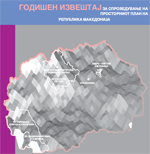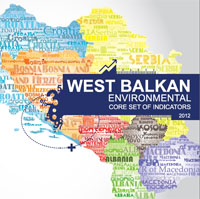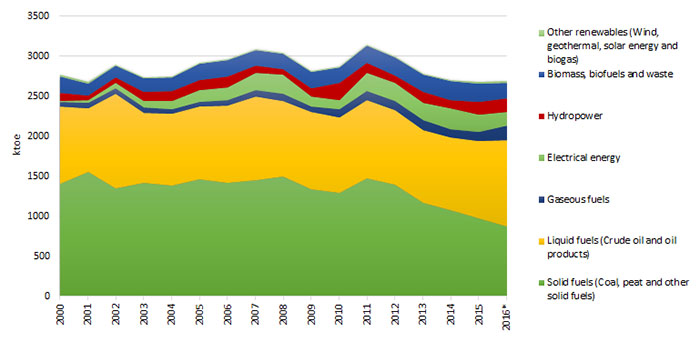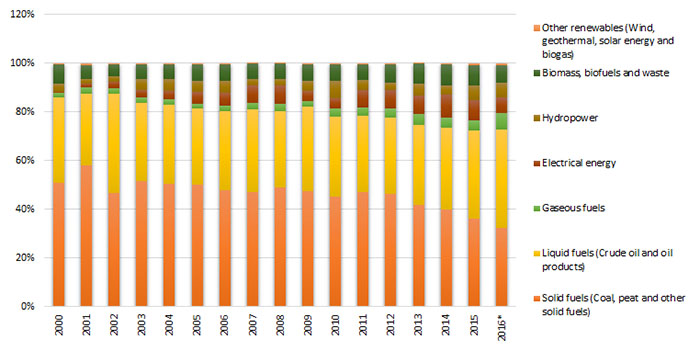| TOTAL ENERGY CONSUMPTION BY FUEL |
Primary energy consumption or gross inland consumption represents the total quantity of energy necessary to satisfy the total national needs for energy for energy transformations, all types of consumption by energy sector and final energy and non-energy consumption.
The total energy consumption is calculated as sum of the total energy consumption originating from solid fuels, oil, natural gas, electricityand renewable sources.
The indicator “Primary energy consumption by fuel” is expressed in thousand tonnes of oil equivalent (ktoe) and in percentage as ratio between the total energy consumption per fuel and the total energy consumption of all fuels.
- thousand tonnes of oil equivalent (ktoe)
- percentage (%)
What are the trends conserning the share of fuels in the total energy consumption?
The total energy demand in 2016 compared to 2000 has decreased by 2.9%.The highest share in the total energy demand in 2016 belongs to oil products and their share is40.4%.For the period 2000to 2016, the share of natural gas was increased from 1.9% to 6.6% in the total energy demand.
In the period from 2000 to 2016, the use of solid fuels has decreased from 50.8% to 32.4%.
Figure 1. Total energy consumption by fuel
Figure 2. Share by fuel in the total energy consumption
Data coverage: excel
Source: State Statistical Office, http://www.stat.gov.mk/Default_en.aspx
In tha past period, dominant energy sources in the Republic of Macedonia included solid fuels, oil and oil derivatives. The share of solid fuels in the total energy consumption for the period between 2000 and 2014 was significantly higher compared to other energy sources ranging from 40.9% to 58%. Also, the share of liquid fuels in the total energy consumption was rather significant and ranged between 29.5% and 40.6%. Reduction of ecological footprint of electricity production in thermal power plants fueld by low calorific coal – lignite is among the greatest challenges in the attempt to reduce the effects of gas emissions in the production process.
Renewable energy sources have negligible share in the total energy consumption ranging from 7.8% to 14.6%, except for wood which is mostly used in individual households without adequate filters for combustion gas emissions.
Increase in the share of renewable energy sources in total energy consumption would be at the same time a possibility for economy restructuring in several sectors, energy efficiency in households and industry, as well as jobs creation.
- Methodology for the indicator calculation
Statistical methodology for calculation:
- Regulation on Energy Statistics of the European Parliament and of the Council (Regulation no.1099/2008),
- “Energy Statistics Methodology Eurostat F4, 1998″
- National Strategy for Sustainable Development in the Republic of Macedonia 2009 – 2030[1]
- Strategy for Energy Efficiency in the Republic of Macedonia by 2020[2]
- Strategy for Energy Development in the Republic of Maceodnia by 2030[3]
Legal grounds
Law on Energy; Energy Balance of the Republic of Macedonia – annual planning document defining the demands for energy and the possibility for their supply (Article 16 of the Law on Energy).
[1]https://arhiva.moepp.gov.mk/wp-content/uploads/2014/12/Nacionalna-Strategija-za-Odrzliv-Razvoj-vo-RM-NSSD-Del-1.pdf [2]http://www.konkurentnost.mk/StrateskiDokumenti/StrategijazaunapreduvanjenaEERMdo2020godina.pdf [3]http://www.build.mk/docs/users/cloverstack/Strategija%20za%20razvoj%20na%20energetikata%202008-2020%20so%20vizija%20do%202030.pdf- Reduction in the dependence on imported fuels and reduction in inefficient energy consumption;
- Modernization of energy infrastructure and diversification of energy supply (extension of the network for natural gas is an important essential element for the implementation of all measures envisaged towards energy efficiency);
- Participation in of regional cooperation and compliance with the legislation of the Energy Community.
- Eurostat
- ECE/UN
- IEA/OECD
| Code | Title of the indicator | Compliance with CSI/ЕЕА or other indicators | Classification by DPSIR | Type | Linkage with area | Frequency of publication | |
| MK NI 029 | Total energy consumption by fuel | CSI 029
EE 24 |
Total energy consumption by fuel | D | А | energy | annualy |







































































